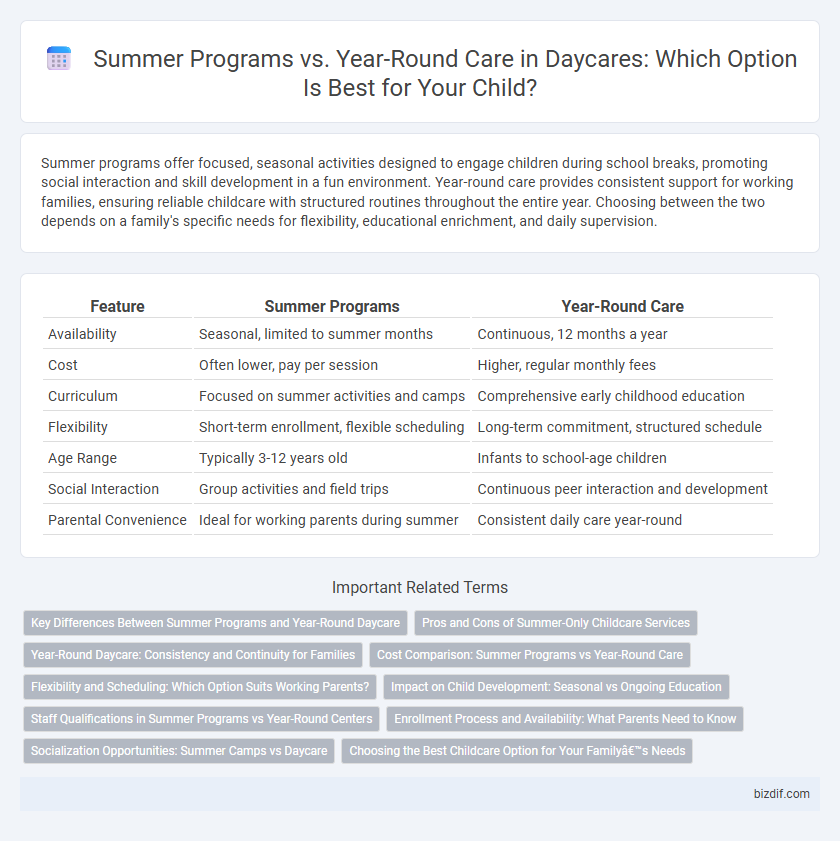Summer programs offer focused, seasonal activities designed to engage children during school breaks, promoting social interaction and skill development in a fun environment. Year-round care provides consistent support for working families, ensuring reliable childcare with structured routines throughout the entire year. Choosing between the two depends on a family's specific needs for flexibility, educational enrichment, and daily supervision.
Table of Comparison
| Feature | Summer Programs | Year-Round Care |
|---|---|---|
| Availability | Seasonal, limited to summer months | Continuous, 12 months a year |
| Cost | Often lower, pay per session | Higher, regular monthly fees |
| Curriculum | Focused on summer activities and camps | Comprehensive early childhood education |
| Flexibility | Short-term enrollment, flexible scheduling | Long-term commitment, structured schedule |
| Age Range | Typically 3-12 years old | Infants to school-age children |
| Social Interaction | Group activities and field trips | Continuous peer interaction and development |
| Parental Convenience | Ideal for working parents during summer | Consistent daily care year-round |
Key Differences Between Summer Programs and Year-Round Daycare
Summer programs in daycare typically offer themed activities, outdoor play, and flexible schedules tailored for school-aged children during vacation months. Year-round daycare provides consistent care throughout the entire year, supporting working parents with structured routines and early childhood education. The key differences include program duration, curriculum focus, and availability, with summer programs emphasizing enrichment activities and year-round care prioritizing steady developmental support.
Pros and Cons of Summer-Only Childcare Services
Summer-only childcare services offer flexibility for families seeking seasonal care, often featuring specialized programs like outdoor activities and enrichment classes tailored to school breaks. These programs can be cost-effective by eliminating year-round fees but may lack continuity in childcare and developmental support compared to year-round care. Families must weigh the advantage of focused summer engagement against potential gaps in consistent routine and socialization opportunities outside the summer months.
Year-Round Daycare: Consistency and Continuity for Families
Year-round daycare offers unmatched consistency and continuity for families, ensuring children receive stable care regardless of season changes. This continuous enrollment supports steady developmental progress through familiar routines and ongoing relationship building with caregivers. Families benefit from predictable scheduling and the convenience of childcare availability throughout the entire year.
Cost Comparison: Summer Programs vs Year-Round Care
Summer programs at daycare centers typically offer a more affordable option with flexible enrollment periods and often lower daily rates compared to year-round care, which involves a consistent monthly fee regardless of seasonal attendance. Year-round care provides continuous services, making it cost-effective for parents seeking regular, full-time childcare and may include discounts for siblings or long-term commitments. Families with varying schedules and budget constraints should evaluate the overall cost implications, considering factors such as hourly rates, enrollment fees, and additional activity charges unique to summer programs.
Flexibility and Scheduling: Which Option Suits Working Parents?
Summer programs offer focused care during school breaks with flexible hours tailored to seasonal activities, making them ideal for parents with traditional work schedules seeking enrichment opportunities. Year-round care provides consistent, dependable scheduling accommodating varying work shifts and unexpected changes, ensuring continuous support for working parents. Choosing between these options depends on balancing the need for routine stability against seasonal flexibility to best support family work-life commitments.
Impact on Child Development: Seasonal vs Ongoing Education
Summer programs offer intense, focused activities that boost specific skills during a limited period, enhancing cognitive and social development in a stimulating environment. Year-round care provides consistent routines and continuous learning opportunities, promoting steady emotional growth and resilience through daily engagement. Both approaches impact child development differently, with seasonal programs delivering concentrated enrichment and ongoing care supporting stable, long-term progress.
Staff Qualifications in Summer Programs vs Year-Round Centers
Summer programs often employ specialized staff with expertise in recreational and educational activities suited for seasonal engagement, while year-round centers prioritize consistent childcare professionals trained in early childhood development and long-term care strategies. Staff qualifications in summer programs may include certifications in outdoor safety and short-term curriculum planning, contrasting with year-round centers where staff hold credentials in comprehensive child development and continuous curriculum implementation. The focus on different staff qualifications reflects the unique demands of seasonal enrichment versus ongoing developmental support in daycare settings.
Enrollment Process and Availability: What Parents Need to Know
Summer programs often require separate enrollment with limited availability due to seasonal demand, making early registration crucial for securing a spot. Year-round care typically offers ongoing enrollment options, providing more flexibility and consistency for families seeking stable childcare throughout the year. Parents should verify program dates, waitlist policies, and payment terms to ensure smooth transitions between summer sessions and regular daycare services.
Socialization Opportunities: Summer Camps vs Daycare
Summer programs offer intensive socialization opportunities by grouping children in diverse activities and field trips that foster teamwork and new friendships over a short period. Year-round daycare provides consistent daily interactions, promoting long-term relationship building and steady emotional development through routine social engagement. Both environments enhance social skills, but summer camps emphasize experiential learning while daycare supports continuous peer bonding.
Choosing the Best Childcare Option for Your Family’s Needs
Summer programs offer structured, seasonal activities that enhance children's social, cognitive, and physical development, making them ideal for families seeking enrichment during school breaks. Year-round care provides consistent supervision and routine, supporting working parents with reliable child care throughout the entire year. Selecting the best childcare option depends on your family's schedule, developmental goals, and budget, ensuring the chosen program aligns with your child's needs and your household's demands.
Summer programs vs year-round care Infographic

 bizdif.com
bizdif.com